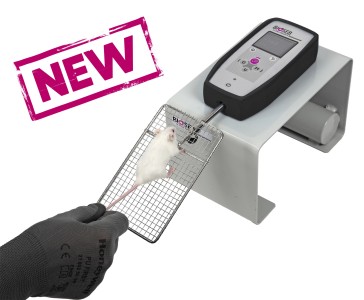Authors
J.Linden, L.Fassotte, E.Tirelli, JC.Plumier, A.Ferrara
Lab
Université de Liège, Liège, Belgium
Journal
Behavioural Brain Research
Abstract
Middle cerebral artery occlusion (MCAO) is the most common animal model of cerebral ischemia and induces various functional impairments. Long-lasting deficits resulting from MCAO however, remain insufficiently characterized, especially regarding cognition. Yet, behavioral flexibility, a prominent cognitive process is found impaired after stroke in humans. We thus used an operant-based task to assess behavioral flexibility in mice after MCAO. Three weeks after 30 min MCAO surgery, mice were subjected to a battery of sensorimotor tests (rotarod, vertical pole test, spontaneous locomotion and grip-strength test). Behavioral flexibility was then assessed in an operant task, in which mice, rewarded according to a FR5 schedule of reinforcement, had to alternate their operant responses between two levers from trial to trial. Regarding sensory and motor functioning, only the pole test yielded a significant difference between MCAO and sham mice. In the operant flexibility task, results showed a behavioral flexibility deficit in MCAO mice; neither the operant response acquisition nor the appeal for food rewards was altered. In conclusion, our operant-based task revealed a long-lasting behavioral flexibility deficit after MCAO in mice.
BIOSEB Instruments Used
Grip strength test (BIO-GS3)
Source :
http://www.sciencedirect.com/science/article/pii/S0166432813006360

 Pain - Thermal Allodynia / Hyperalgesia
Pain - Thermal Allodynia / Hyperalgesia Pain - Spontaneous Pain - Postural Deficit
Pain - Spontaneous Pain - Postural Deficit Pain - Mechanical Allodynia / Hyperalgesia
Pain - Mechanical Allodynia / Hyperalgesia Learning/Memory - Attention - Addiction
Learning/Memory - Attention - Addiction Physiology & Respiratory Research
Physiology & Respiratory Research











![Dynamic Weight Bearing 2.0 – Postural Module [Add-on]](https://bioseb.com/733-home_default/dynamic-weight-bearing-20-add-on-postural-module.jpg)
























 Pain
Pain Central Nervous System (CNS)
Central Nervous System (CNS) Neurodegeneration
Neurodegeneration Sensory system
Sensory system Motor control
Motor control Mood Disorders
Mood Disorders Other disorders
Other disorders Muscular system
Muscular system Joints
Joints Metabolism
Metabolism Cross-disciplinary subjects
Cross-disciplinary subjects CONFERENCES & MEETINGS
CONFERENCES & MEETINGS 